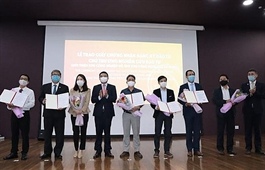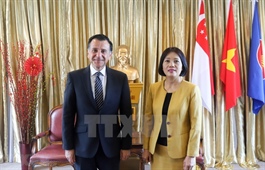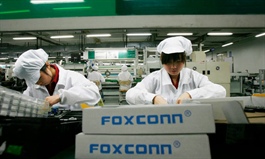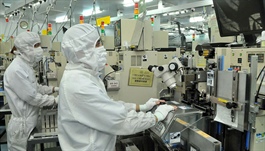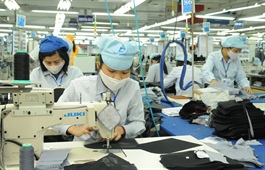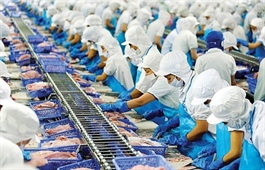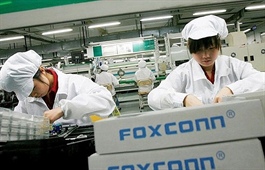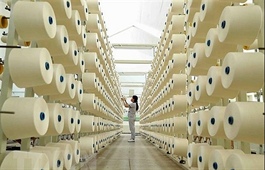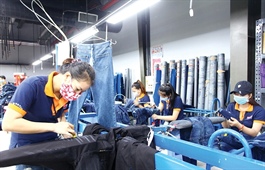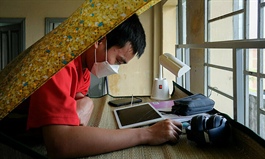Prolonged pandemic issues cloud recovery
Prolonged pandemic issues cloud recovery
Following the new coronavirus outbreaks in a number of localities, Vietnam’s economy could face yet another difficult phase in the early days of the new lunar year as production and services are hindered in several sectors. Nevertheless, economists expect the impact to be less severe compared to the previous year.
Dinh Quang Hinh, analyst at VNDIRECT Securities JSC, noted that the local economy’s recovery “will slow down”, especially in the next two months. According to Hinh, the tourism industry may still be the most affected by the new COVID-19 wave.
Reports from travel and airline businesses showed that many travellers cancelled flights and hotel reservations, and postponed their plans. In addition, the blockade in some localities such as Hai Duong province and the closure of a number of non-essential services in other cities and provinces may reduce the growth rate of several service sub-sectors, especially accommodation, catering, tourism, and entertainment.
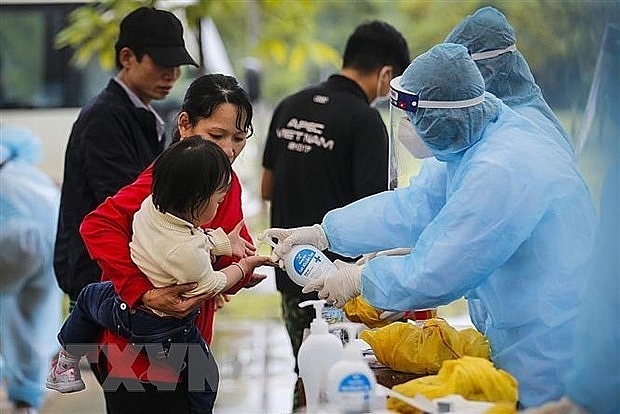
At a cocentrated quarantine area. Photo: VNA
|
Unfeasible policies
Facing the serious impact of COVID-19 on the economy, Assoc. Prof. Dr. Pham The Anh, chief economist of the Institute for Economic and Policy Research (VEPR), said that the country could not pursue macro policies in the same way other countries would do, for example through large-scale monetary easing, due to limited financial resources after years of deficits, coupled with constraints to inflation and exchange rate targets.
Vietnam was one of the few countries in the world with positive economic growth in 2020. But this year, according to Anh’s observation, “the policy space is no longer wide” to support economic growth and social security.
Last year, the State Bank of Vietnam lowered interest rates three times and supported commercial banks with a VND250-trillion package ($10.87 billion), which is still being deployed. In addition, pandemic prevention and social backup subsidies to ease the impacts of the crisis are also putting great pressure on the budget balance.
In 2021, monetary policy, particularly interest rate tools, will see a significantly reduced effectiveness, according to the VEPR’s chief economist.
Anh also warned about an asset bubble that is forming in the stock and real estate markets. Last year, property market saw significant growth, mainly because real estate represented a haven for investors’ idle money.
When price increases on asset markets are large enough to create a wealth effect, consumption increases on non-essential goods could lead to a spillover of increased prices from the asset to the consumer market and, albeit slowly, manifest a rise in prices as the loosening policy is pursued for a long enough time.
The latest VEPR report from February 9 also identifies that the top priority at this time is ensuring social security, keeping macroeconomic stability, and reducing the burden for businesses. Policies to support these also need to continue to be implemented with a higher concentration and more substance, aiming for the right audience and their actual needs.
As such, the report suggested that financial burdens for businesses like loan interests and land rents should be frozen or suspended for the time being, in addition to considering cutting trade union fees to support businesses.
According to the VEPR, the group of businesses that was not affected by the disease or had seen an effective transformation should be encouraged with credit, the right institutional environment, and sectoral policy. These policies should be driven in a way that stimulates demand and assists consumers to pay for products and services, instead of directly sponsoring the company.
“We believe that tax extensions and reductions, if any, should only be applied to VAT instead of corporate income tax (CIT),” Anh said, further explaining that the reduction of CIT only supports a small number of businesses that is either not affected or even benefits from the pandemic. The CIT reduction also risks creating deeper inequality in the business environment, adversely affecting the economic recovery.
Cautious optimism
This year will be the first of the new leadership of the Party and government and is expected to see many new steps, policies, and specific actions for the socioeconomic development. International developments such as the new US president and possibly more predictable policies could make the international environment less uncertain.
However, the continued competition between the United States and China does not protect from new risks that could appear. In this context, the chief economist of VEPR said that supply-side policies could be the most useful for Vietnam to reinforce fundamental elements of the economy.
“Macroeconomic stability, particularly inflation, interest rates, and exchange rates, need to be kept stable, which is essential to prepare for the post-pandemic recovery period. The Vietnamese economy is currently in a difficult time, while the return of a tightened monetary policy could lead to further difficulties for businesses,” Anh said.
At this point, even with the pandemic in the country fully controlled, many export-oriented sectors could face long-term difficulties as COVID-19 remains present throughout the world. Anh found that accelerating public investment, especially for key national projects, is a must to support economic growth.
“The division of multiple bidding packages and a more scattered implementation in many localities could create better spread,” he suggested.
At the same time, a reduction of the recurrent spending from the state budget by at least 10 per cent could be done to devote resources and overcome the consequences caused by the pandemic.
According to experts, many shortcomings in operating economic policies have been revealed, so efforts to improve administrative procedures and the business environment should continue to be maintained.
The diversification of import-export markets also needs more attention to avoid heavy dependence on several major economic partners. Despite delays, Vietnam could step-by-step build up fiscal buffers to prevent further economic shocks in the coming years.
On the bright side, Vietnam’s industrial production seems to expand in the first months of the new year. According to the General Statistics Office, although the industrial production index in January decreased by 3.2 per cent compared to the previous month, it increased by 22.2 per cent over the same period last year.
Meanwhile, the purchasing managers’ index in January decreased slightly to 51.3 from 51.7 points in December but remained above the 50 points level.
Optimistic but cautious, VNDIRECT’s Hinh expected that the manufacturing sector will be less affected by this COVID-19 surge as the global economy could recover stronger in the coming months, thanks to vaccines and more incoming orders for products made in Vietnam.
More time will be needed to observe and quantify the potential impact on the economic outlook, but Vietnam’s macroeconomic foundation may continue to be strengthened backed by current account and trade surpluses, rising foreign exchange reserves, and decreasing inflationary pressure.
|
At last week’s government meeting on deploying key tasks and activities against COVID-19 after Lunar New Year, Prime Minister Nguyen Xuan Phuc encouraged the public to use the Bluezone app and implement the 5K principles, as well as ensure safety and prevent disease transmission in schools, markets and supermarkets, hospitals, and business establishments, especially those with large numbers of people. “We need to be fully determined, more and stronger than ever before. We must be determined to organise the effective implementation of the resolution of the 13th National Party Congress in each and every locality,” the prime minister said, emphasising the success in the past five years, especially in 2020, when the power and will of the Party were convincingly demonstrated. He stated that focus must lie on directing and handling the five major balances in national development in the next five years. Firstly, there must be a balance between opening up, innovating, and promoting socioeconomic development while strengthening and enhancing the leadership of the Party and a stable development between market laws and socialist orientation, as well as between state, market, and society, between economic growth and human development, between social progress and environmental protection, and between independence and integration. Secondly, it is necessary is to balance rapid economic development with socially equitable progress, including preserving the environment and protecting the national cultural identity. “For example, like with our pandemic prevention efforts, development must be associated with the lives of the people and balanced and harmonious, letting no person and no locality fall behind, and possibly lose development opportunities,” the PM emphasised. Thirdly, there must be a balance between internal and external forces, between domestic and foreign economies, between internal and foreign trade, between building an independent and autonomous economy with openness and international economic integration. Fourthly, short-term priorities must be weighed against long-term goals. “We must not be subjective and avoid pursuing unsustainable short-term goals,” PM Phuc noted, suggesting that ministries and agencies maintain and firmly believe in the ideals and principles of building a socialist-oriented market economy. Fifthly, national financial resources, public debt, and many other macroeconomic figures must be kept in balance. “Today, we have a good system of macro indicators, but we must ensure it is getting stronger and let next year be even better than last year,” said the prime minister. |



